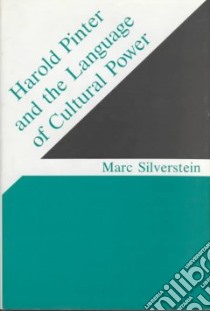Harold Pinter and the Language of Cultural Power - 9780838752364
Un libro in lingua di Marc Silverstein edito da Associated Univ Pr, 1993
- € 28.40
- Il prezzo è variabile in funzione del cambio della valuta d’origine
This book addresses three matters of fundamental importance for an understanding of Harold Pinter's work - how language functions in Pinter's plays, what the relationship is between language and subjectivity in the plays, and what the plays reveal about how language serves as a vehicle for cultural power.
Pinter's work rejects any attempt to conceptualize language in terms of reference, expression, or communication. Rather, his plays exhibit a semiotic understanding of language that demands his audience focus not only on parole, the individual speech act, but also on langue, language as structured system that both enables and constrains parole. The langue that Pinter explores is the ensemble of codes, dominant discourses and structures of representation, and fragments of ideology that give voice to cultural power, creating the speaking subject in the image of that power. For all their attempts to "own" language, Pinter's characters discover that words constitute alienable property; that language forms, de-forms, and re-forms subjectivity; that, as a system preceding the individual, language carries embedded within it the values, desires, and imperatives of the Other - the dominant cultural order.
By introducing questions of subject position and ideology into his discussion, author Marc Silverstein shows how the plays exhibit a political dimension largely ignored by the bulk of Pinter criticism, which attempts to classify his oeuvre as a form of absurdist drama. It is Silverstein's contention that Pinter does not concern himself with the fate of the individual lost in an incomprehensible and meaningless universe (the "absurdist" Pinter), but instead explores the vicissitudes of living within ideological, discursive, and social structures that always exceed the subject.
Through detailed readings of The Birthday Party, The Collection, The Homecoming, Old Times, One for the Road, and Mountain Language, Silverstein argues that what is at stake in these plays is the status of cultural power itself. The plays insistently raise the question, does there exist any possibility for the kind of resistance that can dismantle the network of cultural power, or is that network unassailably monolithic? While arguing that Pinter's plays appear to adopt the latter position, the author emphasizes that these plays still have valuable political lessons to teach. At a moment when much Ideologiekritik naively equates the demystification of ideology and the unveiling of contradictions with the inevitable collapse of that field, Pinter's plays compel us to consider a more viable mode of intervention within cultural formations that seem infinitely recuperable. At a moment when much political theater locates power in individuals, Pinter's emphasis on linguistic codes as vehicles for cultural power reminds us that any decisive attempt to alter the dominant relations of power must involve more than merely replacing those who currently "control" power. Throughout this book, Silverstein argues that we must regard Pinter as fundamentally a political dramatist if we are to appreciate how his plays offer an intensive exploration of how subjectivity emerges in the shadow of cultural power.
Informazioni bibliografiche
- Titolo del Libro in lingua: Harold Pinter and the Language of Cultural Power
- Lingua: English
- Autore: Marc Silverstein
- Editore: Associated Univ Pr
- Collana: Associated Univ Pr (Hardcover)
- Data di Pubblicazione: 01 Novembre '93
- Genere: Lingua Inglese
- Argomenti : Language and culture England History 20th century Power (Social sciences) in literature
- Dimensioni mm: 247 x 171 x 12
- ISBN-10: 0838752365
- EAN-13: 9780838752364


